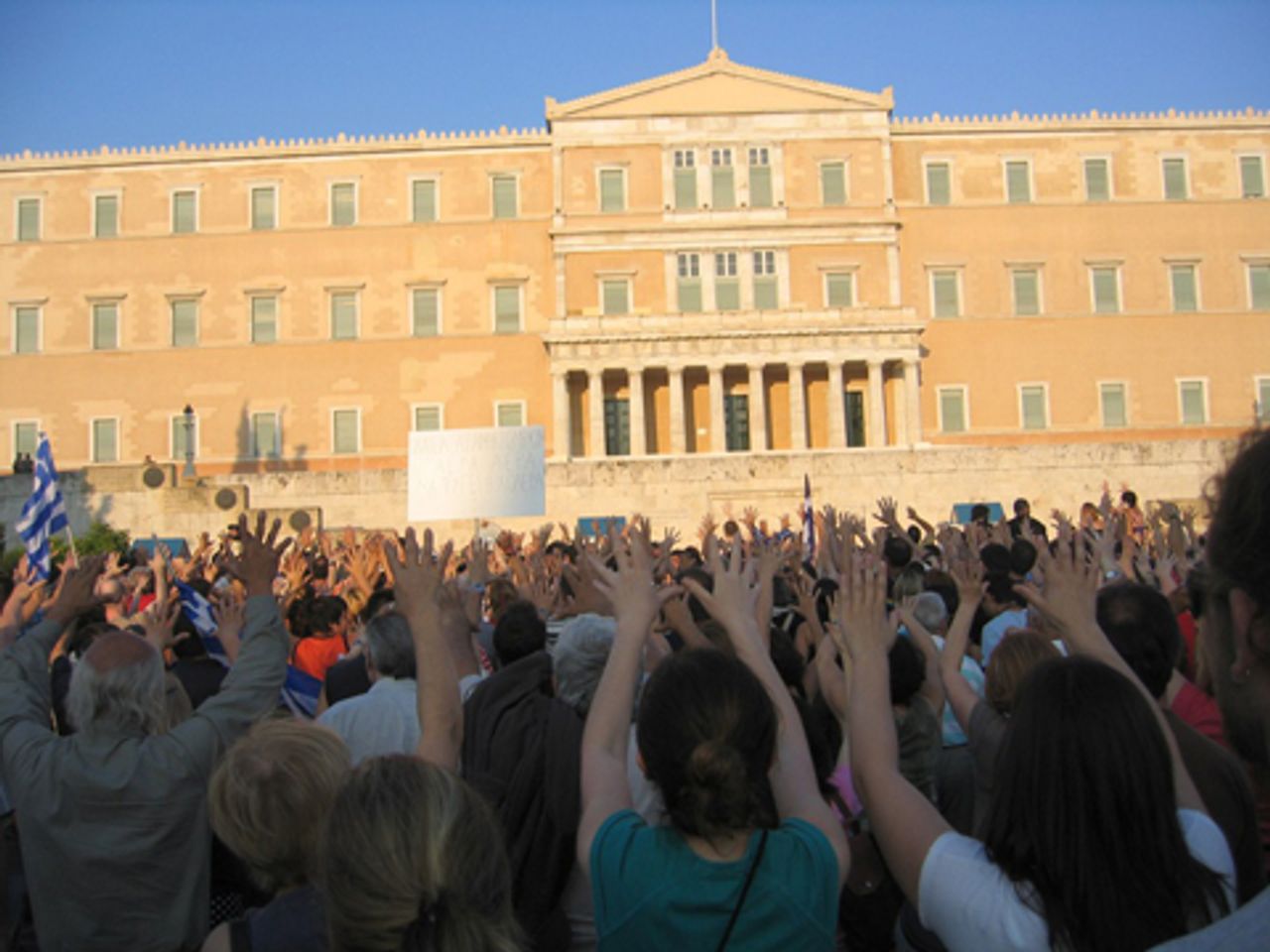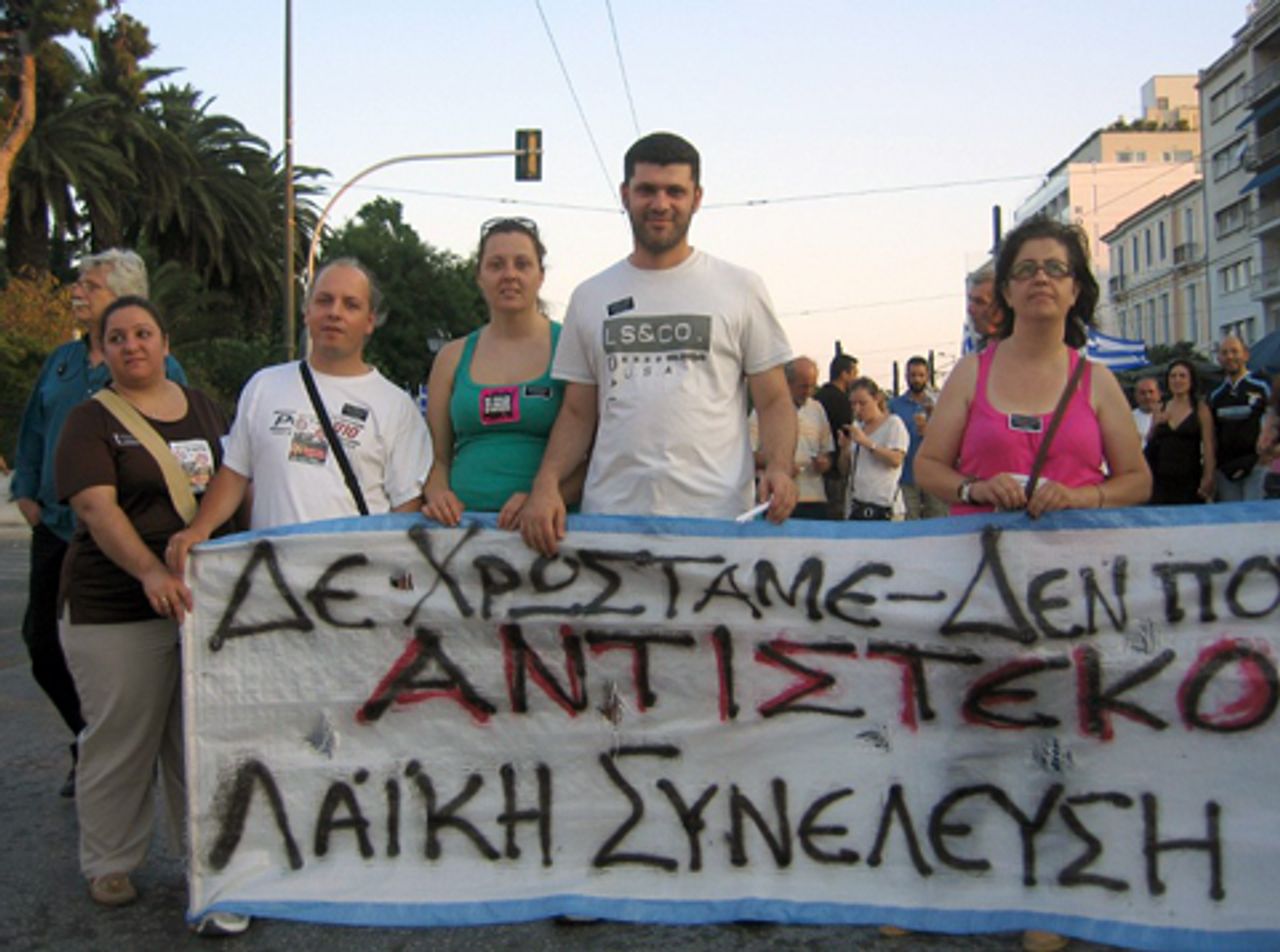In the early hours of Wednesday morning the newly reshuffled cabinet of Greek Prime Minister George Papandreou won a no-confidence vote by a slim majority. All 155 deputies of the ruling PASOK party voted for the government, the 143 MPs from all other parties voted against it. Two independent deputies were absent from the vote.
The confidence vote is an important step to enforce another austerity package, amounting to over €78 billion, against the massive resistance of the Greek population. Some €28 billion of the total is to be raised through spending cuts and increased revenue, while €50 billion will be raised through the privatization of state enterprises.
 Demonstration before parliament in Syntagma Square
Demonstration before parliament in Syntagma SquareThe European Union and the International Monetary Fund had presented the Greek government an ultimatum and declared that they would agree to the payment of the next installment of the already approved €110 billion loan, plus an additional loan package, only on condition that parliament passes the new austerity package.
Following days of street protests which had highlighted inner-party frictions in PASOK, Papandreou had tried to discipline his party by reshuffling his cabinet and calling for the confidence vote. Last week one PASOK MP resigned from the faction and two others resigned their seats.
Papandreou was counting on the support of all PASOK MPs in the confidence vote, because their own seats would be at stake should the party lose a new election. According to current polls, 50 percent of PASOK deputies would lose their seats in a fresh election. A vote on the austerity package is due on June 30, and Papandreou is relying on the PASOK MPs who supported him in the confidence vote to go one step further and vote in favor of the austerity measures.
This result is by no means certain. One PASOK deputy, Panayiotis Kouroublis, who had earlier threatened to reject the austerity package, told parliament: “I will vote for the government tonight but that does not mean I’m giving it carte blanche.”
On July 3, assuming the austerity package is accepted, EU finance ministers will then meet again and decide on the disbursement of the next credit tranche.
Despite massive pressure from its European political allies, the largest opposition party, the conservative New Democracy (ND), has maintained its opposition to the austerity program. The party is calling for more relief for businesses at the expense of cuts in public services and social spending.
The savings program would “not work” in its current form, ND leader Antonis Samaras said in parliament, and called for new negotiations. At one point in the heated debate, his faction even temporarily left the legislative chamber.
Alexis Tsirpas, the leader of the Coalition of the Radical Left (SYRIZA), which is close to the German Left Party, also spoke out against the austerity program. “This is not a program to salvage the economy, it’s a program for pillage before bankruptcy,” he said.
SYRIZA actually maintains close relations with PASOK. Just last autumn Tsirpas had given his support to a PASOK member standing in regional elections in the Athens suburb of Attica, a move that led to a rift within SYRIZA. Faced with massive resistance to the government, however, Tsirpas regards it as tactically advisable to distance himself verbally from PASOK—a stance made all the easier by the fact that Papandreou currently still has a majority.
While the delegates debated and voted in parliament, tens of thousands once again gathered in front of parliament in Syntagma Square to vent their outrage against the cuts and the government. The square began to fill up at 8 p.m. and was packed by 10 p.m.
 Giorgos and Helena (right)
Giorgos and Helena (right)The smaller daily gatherings in Syntagma Square are invariably dominated by activists of the “Indignant” movement who have set up a camp and various stalls devoted to discussion forums. The Tuesday evening demonstration, however, was reinforced by many people who had come from the suburbs. We spoke with clerical worker, Giorgos, and the teacher, Helena, who came to the city center with a group from the industrial suburb of Egaleo.
“We are here because we want to reclaim our lives,” said Giorgos. “The debts are illegal, they should be repudiated. The money has not helped us, it has flowed into the pockets of the rich and privileged. They should also pay it back.”
“It’s about our very existence,” Giorgos continued. “The conditions that they are imposing on us now leave no way out. In two or three years the problems will be even greater. What was necessary was a socialist policy, but a truly socialist policy, not what PASOK does.”
Giorgos thought that the problem was that the Left spoke “with too many voices”. He also had little regard for the unions. “Most trade unions in Greece are in cahoots with the PASOK government,” he said. “If the opposition is in power, they exert some pressure, but when they are in power themselves, they do nothing.”
The one-day general strikes, repeatedly called by the unions, had led nowhere. “The most ‘revolutionary’ thing they had done so far was a work stoppage of four hours,” said Giorgos.
